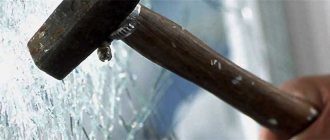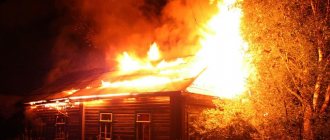ST 168 of the Criminal Code of the Russian Federation.
Destruction or damage to someone else's property on a large scale, committed through careless handling of fire or other sources of increased danger, is punishable by a fine in the amount of up to one hundred and twenty thousand rubles or in the amount of the wages or other income of the convicted person for a period of up to one year, or by compulsory labor. a term of up to four hundred eighty hours, or correctional labor for a term of up to two years, or restriction of freedom for a term of up to one year, or forced labor for a term of up to one year, or imprisonment for the same term.
Commentary to Art. 168 Criminal Code
1. Some of the signs of this crime coincide with the corresponding signs of Art. 167 of the Criminal Code.
2. The objective side of the crime involves the destruction or damage of someone else’s property on a large scale (Note 4 to Article 158 of the Criminal Code), committed in a special way - through careless handling of fire or other sources of increased danger (clause 11 of the Resolution of the Plenum of the Supreme Court of the Russian Federation of June 5 2002 N 14 “On judicial practice in cases of violation of fire safety rules, destruction or damage to property by arson or as a result of careless handling of fire”).
3. The subjective side is characterized by negligence.
What else is regulated by situations related to this article?
Situations related to Art. 168 of the Criminal Code are regulated, among other things, by Resolution of the Plenum of the Armed Forces of the Russian Federation No. 14
There are several points of interest in this resolution.
This is clause 7. Attributing these crimes to the number of crimes against property and referring, on a mandatory basis, to clause 4 of the note to Article 158 of the Criminal Code of the Russian Federation.
Clause 14 of this Resolution states that damage as a result of an offense under Art. 168 is reimbursed according to the rules set out in Article 1064 of the Civil Code of the Russian Federation. This harm is compensated by the person who caused this harm and he compensates it in full.
Thus, there must be fault in the fire and a cause-and-effect relationship between the actions of the culprit and the fire/consequences. And the damage must be caused to someone else's property, which has all the characteristics of property.
Always consult with an attorney regarding situations involving criminal charges against you. You can find out about the cost and ask questions to a lawyer online.
Share this article:
Second commentary to Art. 168 of the Criminal Code of the Russian Federation
1. On the objective side, this crime differs from the crime provided for by the previous norm in two ways.
Firstly, careless destruction or damage to property only on a large scale is criminally punishable (see note 4 to Article 158). Secondly, a mandatory feature of the crime in question is the method of its commission: careless handling of fire or other sources of increased danger (mechanisms, machines, electrical equipment, etc.).
Advertisement
3. The subjective side of the crime is characterized by carelessness in the form of frivolity or negligence.
4. Responsibility begins at the age of 16.
Intentional damage to someone else's property - Article 167 of the Criminal Code of the Russian Federation
Part 1 reproduces two circumstances: malicious intent of actions against possession and serious damage caused by them.
Once convinced of their coincidence, the judge appoints:
- a fine in the amount of up to 40 thousand;
- payment by the culprit of annual earnings;
- work: compulsory, corrective and forced (up to 360 hours, up to a year or two years, respectively);
- detention (up to three months);
- prison (maximum – up to two years).
In Part 2, intentional damage to property for hooligan motives makes it possible for even a 14-year-old to get five years of forced labor or prison.
The text reproduces the following composition of the incident:
- seriously damaged material assets;
- organized arson or explosion that could harm third parties;
- the actions of the criminal unexpectedly caused death/other serious consequences.
It should be taken into account: if the person who committed the evil deed tried to destroy the evidence, his guilt is seriously aggravated: this is already an attempt to evade justice. The case is being considered under another article of the Criminal Code.
Third commentary to Article 168 of the Criminal Code of the Russian Federation
1. The objective signs of this crime, with the exception of its socially dangerous consequences - destruction or damage to property on a large scale, completely coincide with the signs of the act discussed above. The law recognizes the only way to destroy or damage someone else's property: careless handling of fire or other sources of increased danger (for example, high-voltage power lines, oil or gas wells, explosive storage facilities, etc.). Large size in accordance with paragraph 4 of the note to Art. 158 of the Criminal Code of the Russian Federation recognizes the value of destroyed or damaged movable or immovable property of others in excess of 250 thousand rubles. This consequence is expressed in real (positive) material damage caused by the crime to the owner of the property.
2. The subjective side of the crime is expressed in a careless form of guilt in the form of frivolity or negligence. Due to the careless nature of the crime, its motivation and purposefulness have no criminal legal significance. When committing a crime out of frivolity, the subject foresees the possibility of destruction or damage to someone else's property on a large scale, but without sufficient grounds for this, he arrogantly expects that this will not happen. When committing a crime through negligence, the subject does not foresee the possibility of the occurrence of such socially dangerous consequences of his actions, although with the necessary care and forethought he must and can foresee these consequences.
3. The subject of a crime can be any sane person who has reached the age of 16 years.
In this article, the legislator, in order to differentiate responsibility and individualize punishment, included in the sanction for committing a qualified type of crime a punishment in the form of compulsory labor for a period of 180 to 240 hours, and the restriction of freedom was reduced to one year. ‹ Article 167. Deliberate destruction or damage to propertyUpChapter 22. Crimes in the sphere of economic activity ›
Damage to what property will result in punishment?
Damage to certain valuables and other people's resources will always be an illegal act. In this case, the fact which property was damaged will also be of great importance.
Damage may be damage to public or administrative property, including desecration of city buildings or other structures.
Particular attention should also be paid to damage to valuables at the enterprise. In accordance with labor standards, an employee bears a certain responsibility for the organization’s property and for the proper treatment of it. If these standards are violated, the employee may be subject to a corresponding claim and demands for compensation for harm for unlawful use and damage to third-party valuable property.
Certain enforcement measures will also be established in the event that there was intentional or unintentional damage to someone else's military property. In such a situation, the military person faces not only an appropriate penalty, but also removal from service if the damage caused is truly serious.
Damage to someone else's and common property in a communal or rented apartment of the landlord, for example, due to flooding, will also entail the establishment of appropriate liability. In this case, legal claims may be brought against the tenant for compensation and compensation for previously caused damage. Inappropriate handling of valuables is also prohibited when visiting the hotel.
Examples
We have dealt with the differences from related criminal groups. Now let's look at judicial practice. Let's take two examples of such irresponsible acts that caused damage or destruction of someone else's property.
Example 1
The Supreme Court of Tatarstan considered an appeal in a case of damage to someone else's property. The situation itself was as follows: the plaintiff left his car in the parking lot next to the house next to the defendant’s car. And at night there was a fire and both vehicles burned down.
Experts, after examining the defendant’s car, were unable to establish his guilt under Article 168, since his car was not in a state of disrepair. Consequently, the court could not hold the defendant accountable under the article we mentioned above.
As a result, the defendant was assigned a fine under Article 1064 of the Civil Code of the Russian Federation, which he had to pay to the plaintiff. This article of the Civil Code says that a citizen who causes damage to the property of another citizen is obliged to compensate for this damage.
In this case, lack of evidence does not become an obstacle, since the defendant must prove his innocence in the incident on his own . But he could not do this.
Example 2
The Ulyanovsk City Court heard a case involving a fire in a residential building that occurred as a result of welding work carried out in it by the defendant. He failed to take appropriate security measures in a timely manner.
The result of violation of fire safety rules and operation of welding equipment was a fire. The losses suffered by the plaintiff as a result of this fire were estimated at more than one million rubles.
But the defendant admitted his guilt, which somewhat lightened his sentence . In addition, there were two more circumstances mitigating his guilt. He had never been convicted before this incident, and he had a young child. The court ordered the unlucky welder to perform 200 hours of compulsory work.
Proof
Since Art. 168 of the Criminal Code of the Russian Federation implies that the offender did not have any intent, then it is necessary to begin to prove the unpremeditation of this criminal act precisely by confirming the absence of this intent on the part of the perpetrator. This is sometimes quite difficult to do.
Important! Testimony from eyewitnesses of the incident, if any, and expert opinions from the fire scene can help.
The very fact of the presence of violations in the operation of sources of increased danger is established during the relevant examinations - chemical, electrical, fire-technical and others.
Liability for damage to someone else's property
Its type and degree are determined by the following things:
- motives (unkind arbitrariness or carelessness) of the perpetrator;
- depending on the owner of the damaged property: a private individual seeks punishment under articles 167 and 168, and the state – under articles on vandalism;
- consequences for public order and the lives of others.
In such cases, there is a lot of controversy around the concept of “material value”. If a house burns down or expensive equipment breaks down, the crime is obvious.
What if digital media containing valuable business information is damaged? Here everything is no longer so clear and it is more difficult to hold the perpetrator accountable to the fullest extent of the law.
Good to know: mistreatment of rental property can also lead to criminal charges.
Compensation for damage to property
Causing property damage can be punished only by providing the culprit and evidence.
When a neighbor from above flooded the residents on the floor below, forgetting to turn off the water - everything is clear here.
And if, upon leaving the house in the morning, a person finds punctured tires on his car, one can only hope that there will be witnesses or cameras that recorded the moment the crime was committed. If hopes are not justified, then it is unlikely that contacting the police will somehow help the victim.
To be called to account, you need to officially record the fact of what happened - depending on the situation, through the management company, a police representative or the traffic police. Based on this document, an examination and report on the damage caused is made. With this, you can already contact the culprit.
You can peacefully agree with an adequate person on voluntary compensation for damage by drawing up an agreement or taking a receipt. Otherwise, or if the agreement is not fulfilled, you can go to court.
Proof of property damage
To bring the offender to justice, you should immediately contact the police. At the request of a citizen, law enforcement agencies check the circumstances, collect eyewitness statements and evidence. If the appeal occurs after the fact, the owner of the damaged property should prepare:
- documents for the damaged item: papers on ownership of large objects, sales receipts for personal items, registration certificates;
- photo of the damage caused;
- list of eyewitness contacts.
If the incident occurred in a place where there are CCTV cameras, the recordings will help restore the picture of the incident for both law enforcement and the court.
Determining the value of things
To classify the offense under administrative or criminal law, an examination within the framework of the preliminary investigation will be assigned by the police officer in charge of the case. Depending on the nature of the property, experts will focus on:
- purchase price or current market value of similar objects;
- make, model, brand of the manufacturer of the lost equipment;
- the extent of damage and the possibility of complete restoration of the object.
If it is assumed that funds for damage will have to be recovered in court, the owner of the damaged property can order a specialized independent examination.






